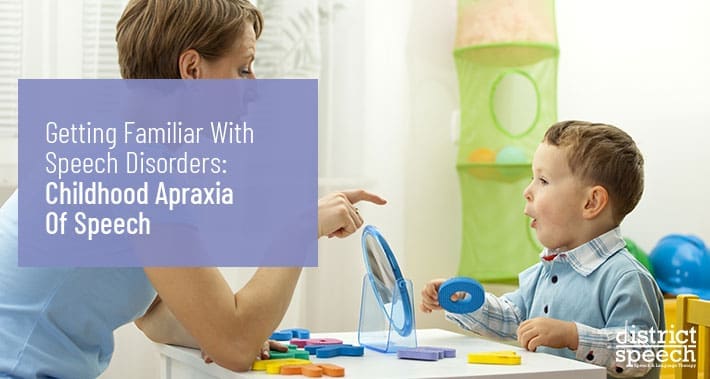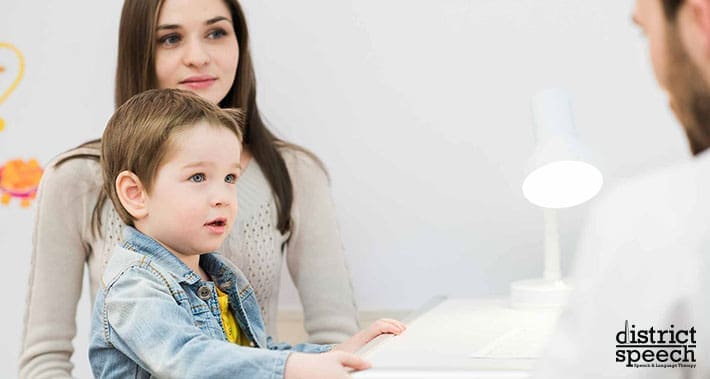
Most of the time, when a child begins to speak, it’s a momentous occhildhood apraxia of speechion which makes for some very proud parents.
However, when there are delays or disorders affecting speech, it can fill your head with questions.
Will my child catch up to their peers?
Is this because of something we did?
What if we did things differently?
The truth is, it’s not usually anything you did.
Your child may just have a speech disorder, like childhood apraxia of speech.
Today we’ll have a close look the causes and treatment for childhood speech disorders like this one.
Keep reading to learn more.
What Is Childhood Apraxia Of Speech?
When you speak, your brain sends signals to your mouth, which instructs your muscles on how to move for sound to come out.
RELATED: How Does Your Brain Control Speech?
When a child has apraxia of speech, it’s because the brain has difficulty sending the signals required in order to coordinate muscle movement.
It should be noted childhood apraxia of speech has nothing to do with muscles being too weak to move the lips and tongue in the ways needed to form speech.
It’s entirely a matter of a poor connection between the brain and the muscles needed to form speech.
That means that your child has the capability to produce speech, they just need practice.
The more they practice their speech intentionally, the better their brain will be at sending the right signals to their muscles.
This is why speech therapists are an important part of improving your child’s speech.
Signs And Symptoms Of Childhood Apraxia Of Speech
If you’re worried your child has childhood apraxia of speech (CHILDHOOD APRAXIA OF SPEECH), here are some signs and symptoms to watch for:
- Delayed onset of speech
- Only being able to form a limited number of letter sounds
- Being able to speak only a limited number of words
- Saying words a different way each time
- Putting the emphasis on the wrong syllable
- Distorting word sounds
- More difficulty with longer words
- Mixing up sounds, such as pronouncing a “P” like a “B”
- Separating syllables, even within a word
Some of the symptoms of childhood apraxia of speech can be similar to those of other speech disorders.
However, there are a number of markers which can help to distinguish it from other speech disorders.
Some of these are as follows:
- Being unable, or having difficulty transitioning smoothly from one word or sound to another
- Having trouble imitating simple words
- Making groping movements while attempting to create speech sounds
- Stressing the wrong syllables in a word, or stressing all syllables equally
- Distorting vowels
- Inconsistency, for instance, attempting to say a word but making different errors on each attempt

What Causes Childhood Apraxia Of Speech?
There are many different things that can cause childhood apraxia of speech.
Sometimes, the cause might be unknown – this is called idiopathic, in clinical terms.
But that’s okay.
You don’t always need to know the exact cause to be able to seek treatment.
Knowing the different causes may help you identify if apraxia is something your child has or is at risk for.
Some potential causes of childhood apraxia of speech can include:
- A genetic disorder
- Metabolic condition or syndrome
- Traumatic brain injury
- Infection in the brain
A stroke can also lead to childhood apraxia of speech.
However, thankfully, strokes in children are very uncommon.
Strokes usually lead to acquired apraxia of speech, which is a speech disorder most common in adults.
Currently, there is no evidence that your child’s environment can cause childhood apraxia of speech.
How Can A Speech Therapist Help With Childhood Apraxia Of Speech?
If you suspect your child is showing signs of childhood apraxia of speech, you should seek out a speech therapist.
Even if it turns out that they don’t have apraxia of speech, a speech therapist will still be able to help.
The longer you wait, however, the more difficult treatment can be, which is why early intervention in speech disorders is so important.
The sooner you contact a speech therapist, the sooner your child can begin improving their language skills.
This also means there will be fewer speech problems in the long run for your child.
The best age to begin speech therapy for your child is always as soon as you notice a problem with their speech.
Let’s take a look at some of the ways a speech therapist can help your child with their apraxia of speech.
1. Testing For Childhood Apraxia Of Speech
In order to provide treatment for any speech disorder, the first step will be to determine what the precise issue is.
If you suspect your child has childhood apraxia of speech, an exam is needed.
An exam will allow your child’s speech therapist to determine if the problem is childhood apraxia of speech, or something else.
During the examination, your child’s language skills, vocabulary and ability to understand speech will be examined.
The speech therapist will look at the muscles used for speech.
This will include the way their muscles move when used to produce word sounds, and how they move their mouth for activities like smiling or blowing.
During this oral motor assessment, they will examine your child’s tongue, lips, jaw, and palate for issues such as tongue tie or cleft palate.
Sometimes, your child’s speech therapist will note things like poor muscle tone that may or may not be indicative of childhood apraxia of speech.
2. Testing For Coexisting Problems
It’s not uncommon for other issues to be uncovered when testing for childhood apraxia of speech.
Some common comorbidities include:
- Autism spectrum disorder
- Fine motor and gross motor difficulties
- Learning disorders
- Hearing loss
- Literacy difficulties
RELATED: How To Help Your Child Learn To Read
3. Sound And Mouth Movement Exercises
Once a diagnosis of childhood apraxia of speech has been made, your child’s DC speech therapist can provide at home speech therapy exercises and other therapies to help correct these issues.
During sound and movement exercises, your speech therapist will show your child how to make the target words or phrases.
From there, your child will attempt to mimic the movements which accompany those sounds.
4. Speech Drills And Practice
With any speech disorder, practicing and drilling the proper pronunciation of things is important.
A 2017 study in the journal Aphasiology found vowel difficulties to be common in children with apraxia.
If this is the case with your child, their speech therapist will focus treatments on this area.
5. Alternative Communication Methods
For children with severe speech disorders, developing alternative ways of communicating can help them to communicate with others.
This can include formal skills such as sign language, or gestures such as mimicking eating or drinking to indicate thirst and hunger.
Devices such as picture boards or electronic tablets can also be useful tools.
Introducing these sorts of alternative communication methods early can help lessen frustration for both parents and children and assist in the development of language skills and vocabulary.
Book An Appointment With District Speech
Are you worried your child has a speech disorder?
Have you noticed they aren’t developing at the same rate as other children their age, or at the same rate their older siblings or cousins did?
District Speech is here to help.
Contact us today to set up a consultation with one of our speech therapists.
We can assess your child for childhood apraxia of speech and other potential issues, and offer a treatment plan to help get their development back on track.
Book your appointment with District Speech today.
1300 I St NW, Suite 400 E,
Washington, DC 20005
- https://g.page/districtspeech
District Speech and Language Therapy specializes in speech therapy, physical therapy, and occupational therapy solutions, for both children and adults, in the Washington D.C and the Arlington Virginia areas.